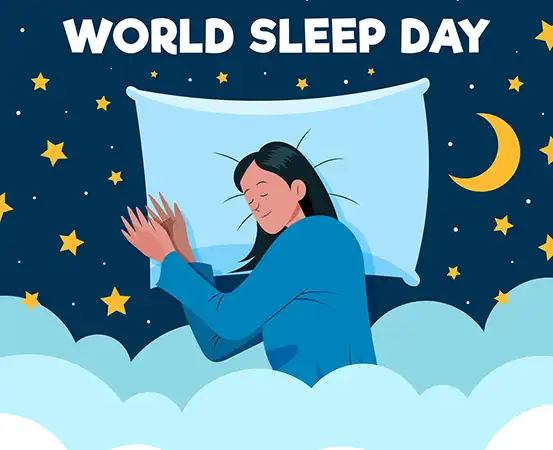
A person not getting enough sleep is a new epidemic across the globe. According to the Centers for Disease Control and Prevention, about 1 in 3 adults in the United States reported not getting enough rest or sleep every day. Sleep deprivation is causing several health problems ranging from daytime drowsiness to even cancer.
What is sleep deprivation?
Humans in general need about seven to eight hours of sleep for restoration of the body. There is no set timing as to how many hours of sleep is considered as sleep deprivation. “However, when individuals are sleeping less than the required amount and it starts affecting their physical and mental functioning, they are considered sleep deprived,” says Dr Kalyani Dilip Karkare, consultant neurologist and epileptologist, Manipal Hospitals, Bengaluru.
She says that sleeping less than six hours gives less time for the body to rest and restore.
What causes sleep deprivation?
- Poor work-life balance: Extended work timings, stress from work and other factors can keep us up late at night and reduce the overall time spent in sleep, thereby causing sleep deprivation.
- Gadget use: Exposure to blue light from the gadgets interferes with the production of sleep hormones like melatonin and delays the initiation of sleep. Excessive gadget use has become one of the major causes of sleep deprivation after the advent of smartphones and social media.
- Sedentary lifestyle: Reduced physical activity and sitting for long hours might tire someone mentally but not physically. This can lead to delayed onset of sleep, as they are not physically tired. Consuming processed food can cause unnecessary sugar high and interfere with the sleep schedule.
- Poor sleep hygiene: Consuming caffeinated or alcohol beverages in the evening after 6pm, not having a set sleep and wake time can all affect the initiation and maintenance of sleep, causing not only sleep deprivation but low-quality sleep.
- Health conditions: Certain sleep disorders like sleep apnea and insomnia can make it difficult to sleep. People experiencing mental health conditions such as anxiety and depression can also have difficulties in sleeping and are often sleep deprived, says Dr Kirthana Ganesan, pulmonology & sleep specialist, Fortis Hospital, Chennai.
How sleep deprivation impacts
Effect on the cardiovascular system
Sleep deprivation can have a negative impact on the heart, both directly and indirectly. Since the body is awake at a time where it should be asleep, it is under stress. “The sympathetic nervous system (SNS) which is responsible for flight and fight response is activated when we stay up at night. This leads to increased heart rate, blood pressure, blood sugar,” says Dr Karkare.
Being sleep deprived for a longer time leads to hypertension, irregular heart rhythms, heart attack, coronary heart diseases etc.
Effect on the endocrine system
When an individual stays awake late at night, it sends a signal to the brain to produce energy. As a result, glucose is released into the blood at unusual timings. This increases the risk for type 2 diabetes, says Dr Karkare. She adds, sleeping less than four hours for a week can push anyone into the prediabetic range.
READ MORE
How sleep deprivation, diabetes and obesity are linked
Nine ways to moderate use of social media
Bad gut leads to bad sleep and vice-versa
Sleep deprivation leads to obesity
“Sleep deprivation causes imbalance of appetite regulation hormones. Leptin is a hormone responsible for the feeling of fullness and ghrelin is a hormone that increases the appetite. When we are awake at night more ghrelin and related hormones are released, resulting in late night food cravings. Obesity can happen due to sleep deprivation and it can contribute to worsening of the condition,” says Dr Karakare.
She adds that obesity can contribute to snoring and obstructive sleep apnea, further deteriorating the quality of sleep.
Acid reflux
Acid reflux and sleep deprivation have a bidirectional relation. “Staying awake late at night can put the body under stress and increase the production of stomach acid. The lower esophageal sphincter (LES) prevents the backflow of acid into the food pipe. In sleep-deprived conditions, this valve does not work well, leading to backflow of acidic material (acid reflux) into the food pipe causing burning sensation in the chest, throat, food pipe, etc.,” says Dr Karakare.
She adds obesity along with sleep deprivation increases the risk for gastrointestinal reflux disease (GERD).
Mental health
Individuals battling with mental health issues have a hard time falling asleep. Lack of sleep causes mood swings, anxiousness, impairing cognitive function and decreases your attention span. Sleep deprivation over a period becomes a pattern and makes us more prone to mental health issues, says Dr Ganesan.
Recently, US surgeon general Dr Vivek Murthy announced that excessive social media usage is causing sleep disturbances in the younger generation and making them more prone to mental health disorders like depression, eating disorders and anxiety.
Sleep deprivation can dampen the immune system
Interleukins are small proteins produced by the immune system to protect our body from foreign particles. When sleep deprived, the human body doesn’t get enough time to repair and restore and starts to get stressed internally. This leads to the release of stress hormones like cortisol and suppresses production of interleukins, thereby making us more susceptible to infections due to a weaker immune response, says Dr Kalyani Karkare.

















